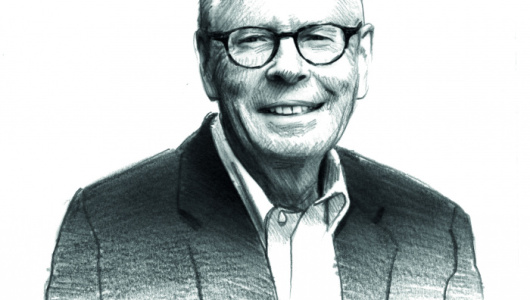Sophie Kennedy was working in a William Hill betting shop across the road from BestInvest’s offices.
“They used to come in and gamble their salary, and I got introduced to a few of them,” she tells me when we meet in a central London wine bar.
“People say you make your own luck, but that was my introduction to BestInvest. And I joined the company as an analyst.”
Kennedy remained there until 2015, before being approached by John Spiers — the founder of EQ Investors.
This space needs to be regulated. There is far too much greenwashing
“He has been a huge part of everything good about EQ,” says Kennedy. “He called me and asked if I wanted to join his business.
“I immediately loved the ethos of the firm. It’s a fantastic place to be. It’s not solely focused on profit — it’s about purpose as well, which really aligned with my values as an individual.”
Kennedy started as a fund analyst at EQ investors.
“You will never find me too far away from talking about asset allocation or fund research,” she says.
“But I think my passion is really driving systemic change in the industry and being part of the strategic business decisions. I want to prove that purpose and profit are interlinked. You can really succeed by doing things the right way.”
Sustainable investment
Now, as joint CEO, Kennedy heads the investment business, guiding its research activity.
She is also largely responsible for ensuring EQ Investors remains at the forefront of sustainable investment.
I love the ethos of the firm. It’s not solely focused on profit — it’s about purpose as well
“John, when he set up EQ, had a real idea in his mind about what he wanted the business to be and what he did not want it to be, having seen what could happen with certain businesses run by private equity, for example.
“He knew he wanted the company to have a purpose that was above just making a profit. And the co-operation community in the UK came at the perfect time.
“The business was incorporated at the back end of 2014. And we became a founding B Corp [B Corporation] in 2015.”
Why B Corp?
“It allowed us to get external validation for something we always wanted to achieve as a business,” Kennedy explains.
“The whole premise of being a B Corp is to bring together a community of businesses that have a desire to balance purpose and profit. It spans much more broadly than just the finance industry, and it’s global.
There’s much more we can do around continuing to improve service to clients
“What it means in practice is changing your legal structure – your articles of association or your constitutional document or the way in which you govern your business and make decisions.”
Spears, who led the B Corp charge, has taken a step back from EQ and is now chair of the firm, but his legacy remains.
“We’re not just focused on quarter-by-quarter financial returns; it’s much more than that. We can take a holistic view of long-term returns. This has allowed us to invest in our innovation.
“Who knows what EQ would have been like as a business if we hadn’t got B Corp certification?” says Kennedy.
The reporting functions we have are a real pull for advisers
“I think we would still have a very strong culture and strong boundaries. But this has been a really nice means of channelling the enthusiasm in the right way.
“We can look at our past submissions [for B Corp status] and see areas where we can improve.”
Collaboration
Kennedy is particularly keen that EQ continues to collaborate with its peers in the B Corp world.
“We set up a finance-and-investment working group and a coalition of 20 segments,” she says.
“There were a lot of commitments made by countries and companies at Cop26 [UN Climate Change Conference]. And, without having strong corporate governance to hold those commitments to account, it’s pretty useless.
Our advisers feel they get the support they need when working one to one with an investment manager
“Short-term commitments are typically garnered by the same CEO. But, once you get to the medium and longer term, when you’re one, two or three CEOs later, it’s hard to hold them to account.”
EQ attended Cop26 in November 2021 but not Cop27 a year later. And Kennedy was less than impressed with the outcomes of the latter.
“It had a lot to live up to. There was a huge number of commitments made at Cop26. And then very little action in the year in between.
“Off the back of Cop26, we felt a real buzz. All this talk about targeting 1.5 degrees. ‘We’re currently at 2.5, and we’re getting further and further away – let’s do something about it.’ And then it kind of fizzled out.
The benefits that diversity can bring often get lost when you’ve got schemes or quotas
“We were hoping for concrete commitments coming out of Cop27, but it underdelivered. We have such a mammoth task ahead of us.”
But it is up to the entire industry to make sure we stay on a path to 1.5 degrees, she believes.
“It falls on the industry to make sure we are clear in what we’re trying to achieve, and then give the advisers what they need to then help their clients.
“We support a lot of the advisers we work with to educate them across the spectrum of capital, explaining what the different kinds of section mean.
“There’s a lot of work that’s been done by various institutions to try and put definitions around certain labels. And the Financial Conduct Authority has written this SDR [Sustainability Disclosure Requirements] labelling scheme consultation paper.
At least 10% of our workforce is hired from a graduate scheme aimed at helping 16- to 24-year-olds get back into the workplace
“My view is that they’re slightly off the mark. But we were really constructive in our feedback to the consultation, which closed at the end of January. And we hope to see some positive moves with that.
“We’re all for regulation. This space needs to be regulated. There is far too much greenwashing going on, and the adviser will be scared. They need to be able to stand up in front of their clients and know that they’ve made the right decision.
“But, when you’ve got such an array of companies, from firms like us — who are hopefully doing it in the right way — to those who are doing it for financial gain, it can be quite difficult to regulate.”
Inclusive environment
In addition to sustainability, Kennedy has always been passionate about the diversity-and-inclusion agenda.
“I’m lucky to be in a position to influence the company’s ethos and values,” she says. “Both internally at EQ and more broadly within the industry I try to foster an inclusive environment where all feel valued.
A lot of our sustainable mandates probably align with the values of many charities
“I am very focused on developing the careers of other women within our company and industry.
“We’re working towards making sure the way in which women are viewed at a board and C-suite level is championed, because that’s just not happening at the moment.”
Kennedy points out that Ann Cairns recently resigned as chair of the 30% Club.
“They brought in a new chair — Hanneke Smits — who was talking about the fact there were only eight women CEOs of FTSE 100 companies.
“The target is 30% or 40%, but a lot of those positions are in non-exec director roles, so probably unpaid or more lowly positions.”
Kennedy does a lot to champion diversity more broadly at EQ.
It falls on the industry to make sure we are clear in what we’re trying to achieve
“We’re part of the Spear programme,” she says, “which means at least 10% of our workforce is hired from a graduate scheme aimed at helping 16- to 24-year-olds get back into the workplace.
“Their backgrounds are really diverse. That brings a diversity of thought and it brings a diversity of how we operate as a business.
“Typically, at a finance company, you will have graduates, who are probably from quite privileged backgrounds. That’s not us.”
People often forget this is not an agenda to get more diversity into firms just for the sake of it, she says.
Who knows what EQ would have been like as a business if we hadn’t got B Corp certification?
“The benefits that diversity can bring often get lost when you’ve got schemes or quotas.
“We are a signatory of the Women in Finance Charter. We met our target in April 2022 and we want to increase that. But that target can be easily manipulated. You can hire and fire here and there to make the numbers work.”
Bespoke service
In terms of the growth opportunity for EQ, the business has developed a more tailored sustainable offering — its bespoke service.
“This allows clients to really align their investments with their social and environmental values, focusing on those areas most important to them,” says Kennedy.
We were hoping for concrete commitments coming out of Cop27, but it underdelivered
“This is becoming increasingly popular with our advisers, who feel they really get the support they need in working one to one with an investment manager.”
Kennedy sees big opportunities for the business to work more closely with advisers and charities.
“There’s a big tailwind in terms of the adviser opportunity. Not many advisers use sustainable investing at the moment. We’re not expecting them to make it their entire work, but there will always be clients for whom sustainable investing, in some guise, is important.
“The charity space is one that we’re also looking into. A lot of our sustainable mandates probably align with the values of many charities. If they’re moving their investment propositions away from the traditional investments towards sustainable investing, there is an opportunity for us.”
She also wants to increase the number of advisers EQ works with.
B Corps allowed us to get external validation for something we always wanted to achieve as a business
“We’ve invested heavily in a number of the risk profilers that advisers use. Having come from a very low base, using none five years ago, we now work with Dynamic Planner, Defaqto, EValue and Oxford Risk. That’s a really nice opportunity to widen the net in terms of the advisers we work with.
“There’s a lot of consolidation in the market, so we need to make sure the service our advisers receive is as good as it can be. The reporting functions we have are a real pull for advisers.”
Gaps in strategy
EQ is working towards its B Corp re-certification, due next year.
“Our previous jump in score was quite impressive,” says Kennedy. “A lot of hard work went into it, and we’re looking at gaps that might exist within our strategy.”
To become a B Corp, a firm must score at least 80 points. In its most recent assessment, EQ scored 151.1. But businesses must increase their score each time. The pressure is on.
John Spears has been a huge part of everything good about EQ
“There’s much more we can do around continuing to improve service to clients, and making sure there’s a better feedback loop to understand what we can do better.
“We launched our propositions off the back of adviser and client demand, so we’re listening to them in terms of how we can broaden the suite of sustainable agreements to cater to client needs.”
This focus on the differing needs of clients is important.
“There’s not one sustainability mandate that fits all,” she says.
“So being able to do that has been great.”
Snapshot
Name: Sophie Kennedy
Age: 35
Family: I live with my husband, Rodger, and our two young children, Mila & Arlo
Potted CV: Academic and industry experience in economics, investments and finance
Hobbies: I’m a massive foodie and I love a night out with friends, when mum life permits
Book recommendation: The Kite Runner, by Khaled Hosseini
Desert island meal: A spicy penne arrabiata with a cold glass of rosé
This article featured in the March 2023 edition of MM.
If you would like to subscribe to the monthly magazine, please click here.
















Comments